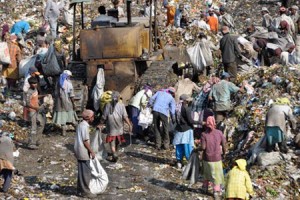A Counterintuitive Take On Trash: The Positive Impact Of An 'Informal Trash Economy'
 In India, there is a thriving market for trash. People make lives for themselves collecting it, sorting it, buying it, selling it: making it useful once again.
In India, there is a thriving market for trash. People make lives for themselves collecting it, sorting it, buying it, selling it: making it useful once again.While the community of trash workers occasionally gets attention from the American media, the focus often revolves around the initial realization that people can earn a living from garbage piles, and what this says about poverty levels.
Katherine Boo’s recent book related to the subject, Behind the Beautiful Forevers, went deeper, exploring the mechanisms of entrepreneurship and exploitation in India. However, there is also a more positive side to this story that often goes uncommented on. An efficient recycling system has a long-term positive effect on society as a whole, and is also something that North America and Europe generally lack. That is a significant part of what the trash economy in India is- an informal recycling system.
Estimates suggest that between 56 and 70 percent of Indian recyclable material actually gets recycled, compared to 30 percent in Europe and the United States. This is because in India, the informal trash economy is highly efficient, and generates a surplus, whereas in rich countries dealings with trash can be seen as a market failure. While Indian government dealings with trash are highly inefficient, a significant portion of the informal workforce-about 90,000 people in Delhi alone — are eager to get their hands on the growing supply of trash so that they can sell it to recycling firms for profit.
The informal trash economy subsidizes the less efficient formal sector, thus benefiting taxpayers as well as the environment. While many of these workers live in very poor conditions, most of them still earn more than the minimum wage, some significantly so.
Many Indian companies buy recycled materials without self-consciously labeling themselves as eco-friendly institutions. Recycling is not necessarily associated with an environmentalist mindset in India, but instead is just another way to reduce the cost of living or doing business. In the west, on the other hand, if recycling gets done it is usually with some concept of environmentalism in mind. It is not thought of as a way to make money but something that people do if they are concerned about the environment — a chore. Environmentalism isn’t nearly as effective a motivating factor as money. Most people in rich countries can barely manage to separate paper from plastic, and then machines have to do the rest of the work. Just separating different kinds of plastic bottles from one another is an enormous process — one that requires investment in the development and production of expensive machines that need energy to run and that are still less precise than human labor.
Companies that use expensive recycled materials in their products will inevitably make sure that customers know about it, in order to get them to accept a higher price. Thus, consumers can find the same feeling of satisfaction from these consciously ecofriendly products they might have gotten from taking the time to separate recyclables. The feeling of having done something good for the environment is also commoditized, even if it’s not that big a seller.
In rich countries, the market hasn’t found a way to deal with excess trash in a way that is profitable in the short term. If India’s economic boom recovers, it may one day join these countries, and the population of people willing to deal with trash cheaply may decline. Right now, rich countries can afford to have an inefficient system for dealing with trash, although it is very expensive. But the longer we wait to find a system that works, the more each piece of trash ends up costing in the long term, both in terms of dollars and in damage to the environment.
A growing global economy and population only means more trash. Finding a way to deal with it profitably soon would be a very smart investment.
You can return to the main Market News page, or press the Back button on your browser.

